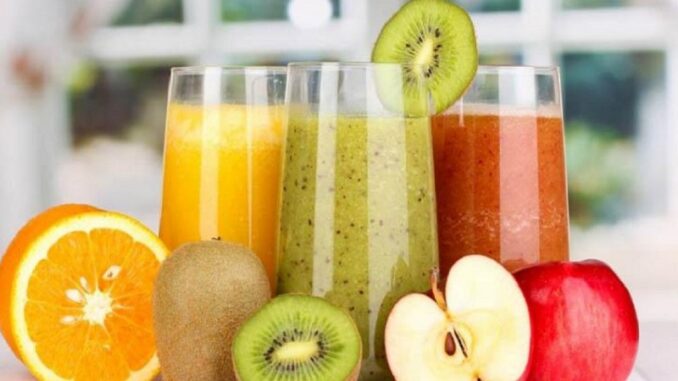
small to large; Almost everyone likes to eat fruits. But many prefer to eat the fruit as juice instead of chewing it. Most people think that no matter how they eat fruit or fruit juice, there is no nutritional difference. Is it really so?
According to a report from Stanford Medicine Children’s Health, one of the world’s top ten children’s hospitals in the San Francisco Bay Area, the benefits of eating fruit are many.
But there is no benefit in consuming fruit juice. Although it is delicious to eat, it is more harmful than vitamins.
Experts say that the regular habit of consuming fruit juice gradually increases the health risks. Along with increase in blood glucose, weight also starts to increase. Which causes various complex diseases including brain, heart.
Meanwhile, according to a report by the Indian media Times of India, fruit juice poses a risk to the body, but there is no health risk to eating fruit.
Rather, weight is under control. Chewing makes the face look beautiful. As a result of cutting the fiber remains intact, the problem of constipation can also be solved by chewing the fruit.
So to ensure good health decide today whether to chew the fruit or juice the fruit
Both chewing the fruit and consuming its juice have their own benefits, and which option is preferable can depend on various factors including personal preference, nutritional needs, and health goals. Here’s a breakdown of the potential benefits of each:
Chewing the Fruit:
1. Fiber Content: Chewing the fruit allows you to consume the fiber present in the fruit’s flesh and skin. Fiber is crucial for digestive health, promoting regular bowel movements, and can help control blood sugar levels.
2. Satiety: Chewing the fruit can lead to a greater feeling of satiety compared to drinking the juice alone. This may help in managing appetite and potentially contribute to weight management goals.
3. Dental Health: Chewing fruits can stimulate saliva production, which aids in maintaining oral health by washing away food particles and neutralizing acids in the mouth that can contribute to tooth decay.
Consuming the Juice:
1. Nutrient Concentration: Fruit juice can provide a concentrated source of vitamins, minerals, and antioxidants found in the fruit. However, it’s worth noting that some processing methods may strip away certain nutrients and fiber.
2. Hydration: Fruit juice can contribute to your daily fluid intake, helping to keep you hydrated. This can be particularly beneficial if you struggle to drink enough water throughout the day.
3. Quick Energy: Fruit juice can provide a quick source of carbohydrates, which can be beneficial for athletes or those needing a rapid energy boost. However, whole fruits also contain natural sugars along with fiber, which can help moderate the blood sugar response compared to juice alone.
Considerations:
Nutrient Loss: Processing fruit into juice can lead to some loss of nutrients, especially if pasteurization or other preservation methods are involved.
Caloric Intake: Fruit juice can be higher in calories compared to whole fruits, especially if sweeteners or additives are included. Monitoring portion sizes is important, especially for those watching their calorie intake.
In summary, both chewing the fruit and consuming its juice can offer health benefits, but the choice between the two depends on individual preferences, nutritional needs, and health goals. Incorporating a variety of fruits in your diet, both in whole and juice form (preferably with no added sugars), can provide a range of nutrients and health benefits.

Leave a Reply